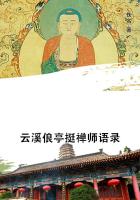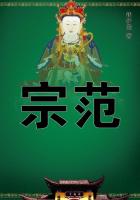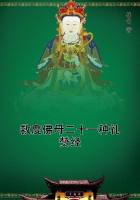But -- O the shame of it! -- it is from you that they think they derive the warrant for such a charge, and we seem to them to be allied to ill-doing from this very fact that we are steeped in the principles of your teaching, and trained in your manners of life.Thus it is not enough that my deep respect for you has profited me nothing, but you yourself have received wanton contumely from the hatred that had rather fallen on me.Yet besides this, is another load added to my heap of woes: the judgment of the world looks not to the deserts of the case, but to the evolution of chance, and holds that only this has been intended which good fortune may chance to foster: whence it comes that the good opinion of the world is the first to desert the unfortunate.It is wearisome to recall what were the tales by people told, or how little 16:1 -- Symmachus was executed by Theodoric at the same time as Boethius.Page 17their many various opinions agreed.This alone I would fain say: it is the last burden laid upon us by unkind fortune, that when any charge is invented to be fastened upon unhappy men, they are believed to have deserved all they have to bear.For kindness I have received persecutions;I have been driven from all my possessions, stripped of my honours, and stained for ever in my reputation.I think I see the intoxication of joy in the sin-steeped dens of criminals: I see the most abandoned of men intent upon new and evil schemes of spying: I see honest men lying crushed with the fear which smites them after the result of my perilous case: wicked men one and all encouraged to dare every crime without fear of punishment, nay, with hope of rewards for the accomplishment thereof: the innocent I see robbed not merely of their peace and safety, but even of all chance of defending themselves.So then I may cry aloud: --'Founder of the star-studded universe, resting on Thine eternal throne whence Thou turnest the swiftly rolling sky, and bindest the stars to keep Thy law; at Thy word the moon now shines brightly with full face, ever turned to her brother's light, and so she dims the lesser lights; or now she is herself obscured, for nearer to the sun her beams shew her pale horns alone.Cool rises the evening star at night's first drawing nigh: the same is the morning star who casts off the harness that she bore Page 18before, and paling meets the rising sun.When winter's cold doth strip the trees, Thou settest a shorter span to day.And Thou, when summer comes to warm, dost change the short divisions of the night.Thy power doth order the seasons of the year, so that the western breeze of spring brings back the leaves which winter's north wind tore away; so that the dog-star's heat makes ripe the ears of corn whose seed Arcturus watched.Naught breaks that ancient law: naught leaves undone the work appointed to its place.
Thus all things Thou dost rule with limits fixed: the lives of men alone dost Thou scorn to restrain, as a guardian, within bounds.F or why does Fortune with her fickle hand deal out such changing lots? The hurtful penalty is due to crime, but falls upon the sinless head: depraved men rest at ease on thrones aloft, and by their unjust lot can spurn beneath their hurtful heel the necks of virtuous men.Beneath obscuring shadows lies bright virtue hid: the just man bears the unjust's infamy.They suffer not for forsworn oaths, they suffer not for crimes glozed over with their lies.But when their will is to put forth their strength, with triumph they subdue the mightiest kings whom peoples in their thousands fear.OThou who dost weave the bonds of Nature's self, look down upon this pitiable earth! Mankind is no base part of this great work, and we are tossed on Fortune's wave.Restrain, our Guardian, the engulfing surge, and as Thou dost the unbounded Page 19heaven rule, with a like bond make true and firm these lands.'
While I grieved thus in long-drawn pratings, Philosophy looked on with a calm countenance, not one whit moved by my complaints Then said she,' When I saw you in grief and in tears I knew thereby that you were unhappy and in exile, but I knew not how distant was your exile until your speech declared it.But you have not been driven so far from your home; you have wandered thence yourself: or if you would rather hold that you have been driven, you have been driven by yourself rather than by any other.No other could have done so to you.For if you recall your true native country, you know that it is not under the rule of the many-headed people, as was Athens of old, but there is one Lord, one King, who rejoices in the greater number of his subjects, not in their banishment.To be guided by his reins, to bow to his justice, is the highest liberty.Know you not that sacred and ancient law of your own state by which it is enacted that no man, who would establish a dwelling-place for himself therein, may lawfully be put forth? For there is no fear that any man should merit exile, if he be kept safe therein by its protecting walls.But any man that may no longer wish to dwell there, does equally no longer deserve to be there.















